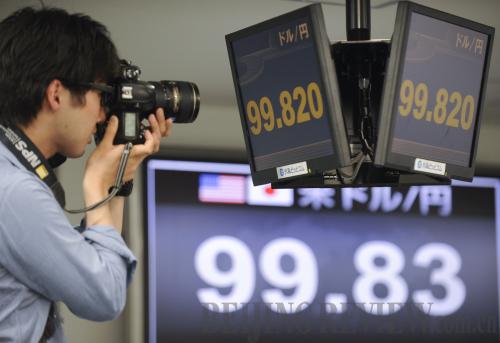|
 |
|
EASING THE MONEY SUPPLY: A photographer shoots the electronic board at a foreign exchange trading center in Tokyo. Japan adopts a quantitative easing monetary policy, causing the depreciation of its currency (XINHUA) |
There's plenty of anxiety to be found inside a two-story building along Beijing's fifth ring road to the city's far south. The building belongs to Beijing Changhao Foodstuff Co. Ltd., a small firm that produces and sells frozen stuffed buns to Japan. But a quickly depreciating Japanese yen is having a harmful impact on business, and the company now faces the real possibility of shutting down.
"For each bun sold to Japan, we charge 2.5 yuan ($0.4). At the end of March, the Japanese importer required a price cut of 15 percent. This is unacceptable for us. Our gross profit rate is only 15 percent, so if we lower the price as required, we will have no profit," said Chang Hao, General Manager of the company.
The reason for the price cut is due to the Japanese yen having depreciated by 25 percent since October last year when the contract was signed. "But compared with October last year, price levels in China have also risen by 10 percent," Chang said. "If the Japanese side insists on lowering prices, we would have to terminate the contract."
Like Changhao, Shanghai Hyron Software Co. Ltd. is also confronted with problems because of the yen. Seventy percent of Hyron's revenue comes from Japan, and according to its annual report released on April 10, in 2012 the company's sales revenue in Japan dropped, and its gross profit rate declined by 4.43 percent. "The financial tools the company has utilized, such as forward settlement of foreign exchange, have been unable to fully recover the losses brought by yen's depreciation, which is reducing the company's net profits," said the report.
The weak yen since the second half of last year has heavily beat Chinese export-oriented companies aiming at the Japanese market. Figures from the National Bureau of Statistics (NBS) showed that in the first quarter this year, China's trade volumes with economies such as the United States and the Association of Southeast Asian Nations all kept stable growth, but trade with Japan dropped by 10.7 percent over a year ago.
Affecting economic growth
Yi Xianrong, a researcher with the Institute of Finance and Banking of the Chinese Academy of Social Sciences, thinks the Japanese Government is behaving irresponsibly by implementing an "indefinite quantitative easing policy," causing a constant depreciation of yen which has a serious impact on the Chinese economy.
The decline of China's foreign trade is the most direct influence. According to the China International Capital Co. Ltd., if yuan appreciates 20 percent against yen, China's exports will drop by 2.5 percentage points.
Besides the trade decline, Japan's manufacturing industry will be more competitive as yen depreciates, which will squeeze the international market of made-in-China products. "China and Japan make almost the same products, especially in the automobile and home appliance sectors. Since the production costs for Japanese companies are high, the prices of their products are usually 10-20 percent higher than Chinese products," Yi said. "Now yen has depreciated over 25 percent against yuan, making Japanese products much more competitive against made-in-China equivalents."
"Yen depreciation will also cause the depreciation of other Asian currencies, leading to an appreciation of yuan. This will dampen China's export to Asia and other regions of the world," Yi continued.
| 